←BACK
A Conversation with Maka Clifford ’05: Red Cloud’s New Director of Curriculum and Assessment
August 25, 2017
|
|
After going to college in San Francisco, teaching abroad in Japan, and earning his Master’s Degree at Columbia University in New York City, graduate Maka Akan Najin Clifford '05 fulfilled his dream of returning to Red Cloud’s campus just over five years ago. He began as a social studies and history teacher, and then ultimately took on the role of coordinating the work of Red Cloud’s team of volunteer teachers from across the country. Now at work on his second Master’s degree through the University of Notre Dame, Maka is also stepping into the position of Director of Curriculum and Assessment—a role that will shape what education looks at Red Cloud for years to come.
|
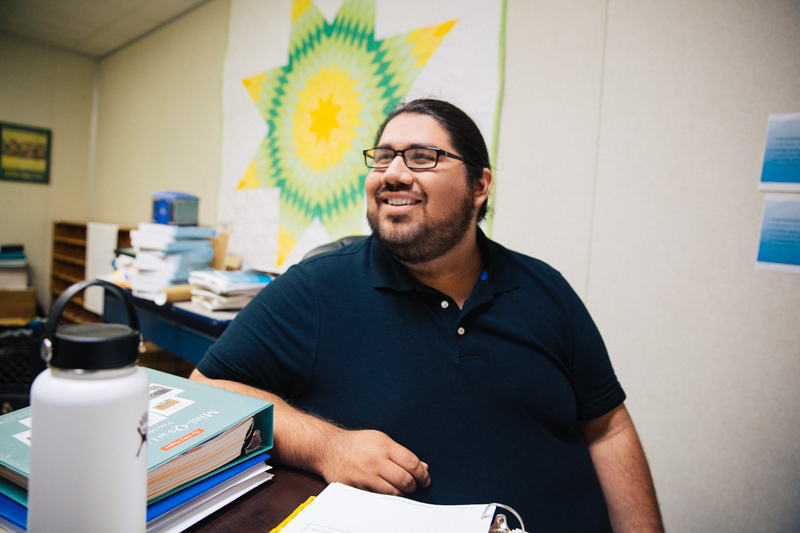
|
What made you want to come back to Red Cloud, and what does it mean to take on this new role?
Red Cloud was a really important part of my life—I had some of the best years of my youth here. I knew that I wanted to give back. So when I came back to the reservation after getting my first Master’s degree, I wanted to be at Red Cloud and I wanted to make a difference. This is going to a new challenge for me—I’m a young Director of Curriculum and Assessment. But I’m really looking forward to working with our teachers in a different capacity—to increase their capacity to serve our students. It’s my strong belief that all students are able to learn, and that they will learn under powerful instruction, with powerful teachers who love what they do. I feel honored to be part of that work.
What is your vision for this next chapter?
I believe that all of our students have the ability and opportunity to succeed at Red Cloud.In the years to come, I envision our teachers utilizing 21st century practices, bringing technology into the classroom, advancing our opportunities for dual enrollment in college credit and advanced placement curriculum, and overall supporting our students toward their college dreams.
But it’s not just that I believe that—it’s borne out by research. Education research has shown over and over again that good instruction—research-based, evidence-based instruction—as well as effective classroom management actually outweighs the impact of socio-economic status and family life. So even students who come to us from a lower socio-economic status can be impacted by excellent education. We want to provide that at Red Cloud and I want to continue to work toward that.
|
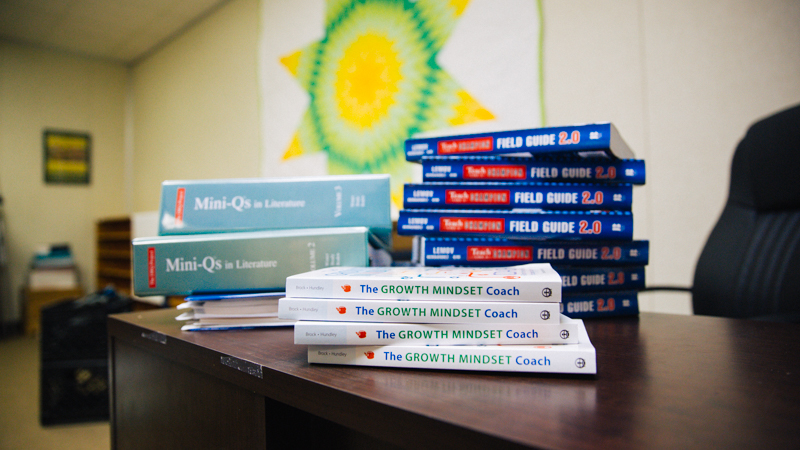
|
What’s working in Red Cloud’s curriculum, and where do we need to advance?
I think Red Cloud already offers teachers immense room for creativity. We offer teachers the chance to know our students, so they can form very positive and respectful relationships. Our teachers have the ability to know who our students are, and therefore provide them the best support that they possibly can. All of our teachers take advantage of the opportunity to be truly mentors for our students, and really help to guide them toward what they hope to achieve.
We’re doing so much and we really have overcome a lot, but we always need to be ready for what’s next. We need to keep growing—to keep our minds open. We aren’t the same school that opened up in 1888, and we aren’t the same school that switched from Holy Rosary Mission to Red Cloud Indian School decades ago. Evolving and growing is how we’re truly going to keep our success moving forward. We need to focus on what is to come in the future and how to prepare our students for that.
|
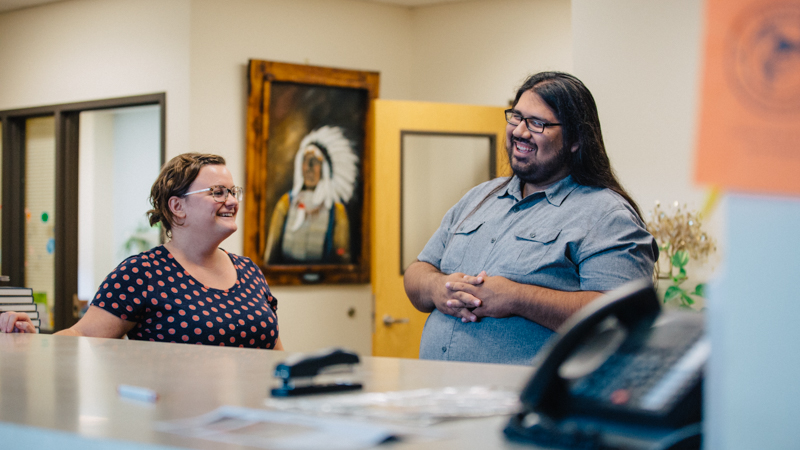
|
When it comes to education, what sets Red Cloud apart?
We offer a really competitive academic program, a program that builds off of the college prep curriculum that’s common in a lot of college preparatory institutions.
We offer coursework in spiritual formation that allows our students to not only explore a culture that might be other than their own. They are able to learn the values and history of our Jesuit founders and apply those Jesuit values to their lives. At the same time, they are able to form their own identity through study of their own traditions and heritage as Lakota people.
And in a sense, that really speaks to what is excellent practice in education—culturally empowering our students to understand fully their identity and become more than familiar with a culture outside of their own. That is what forms truly critical thinking adults who can take on the world and enter the workforce, pursue their college lives and careers, and be prepared for civic life.
We’re not parochial, we’re not local: we want our students to move through the world, in the world, in this shared space that we have called the United States of America, and we want our students to succeed no matter where they are in that.
We also empower our students in their own identity by having the only K-12 Lakota language program in the country. So our students walk away from Red Cloud truly having some solid foundation in their Native language, and they are able to take that with them as they move forward. And learning a language is also another a way to increase our students’ capacity for learning in all subject areas.
We really are dynamic in what we offer; a college preparation curriculum, a multi-faith spiritual formation curriculum, and language program that empowers our students to know their heritage and use their language from their grandmothers and grandfathers.
|
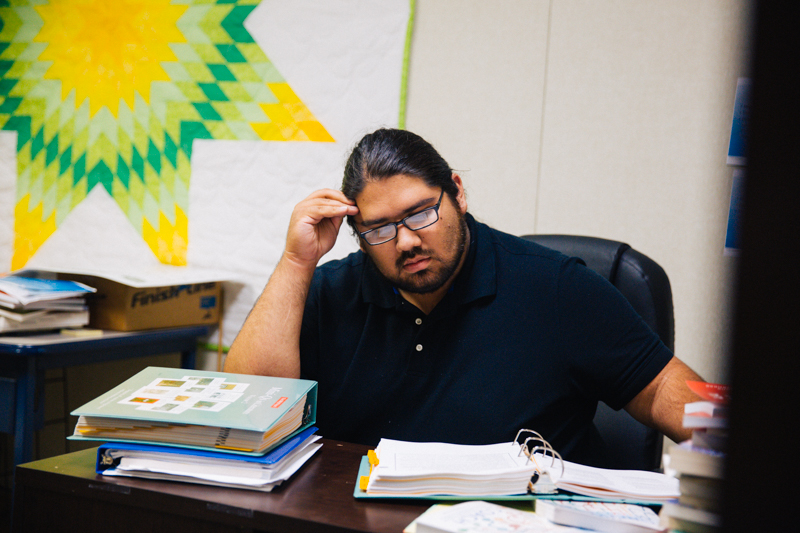
|
What does that approach mean for our students?
We want our students to move beyond survival, and so that is what we I think strive for. Our students, regardless of what socio-economic status they come from—and there’s a range here—are shown all the possibilities, the opportunities, and the doors that they can then choose to open. We also want to encourage them to fulfill their academic dreams—their college wishes, and career wishes—and then to ultimately to come back and share that success with their own community.
So often the narrative of the Pine Ridge Indian Reservation is that of deep and immense poverty, of incredible violence or sadness. But Red Cloud is a pocket of hope. I believe that. And I think that’s exactly what we provide here, is hope for the future. And the tools in order for our students to open those doors.
Looking forward, what are your hopes for the future?
I hope that, in my time here as Director of Curriculum, I can see true growth in our students’ ability to not only to enter college—the college of their choice and the college that works best for them—but to also see them succeed and graduate from college.
I believe that our schools have the capacity to produce students who are academically enriched, culturally empowered, politically and socially conscientious, and who can grow in their relationship to their creator. As long as we continue to focus on educating the whole child, then our students have the power to succeed no matter where they go.
|
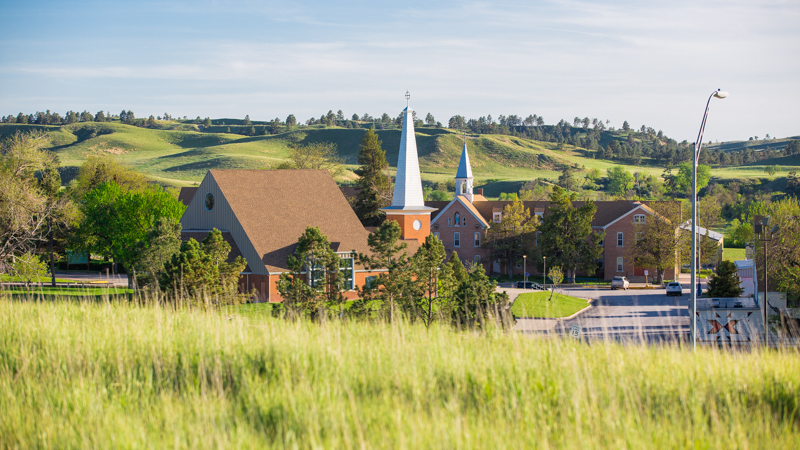
Photos © Red Cloud Indian School/Willi White '08
Want to receive more stories like this?